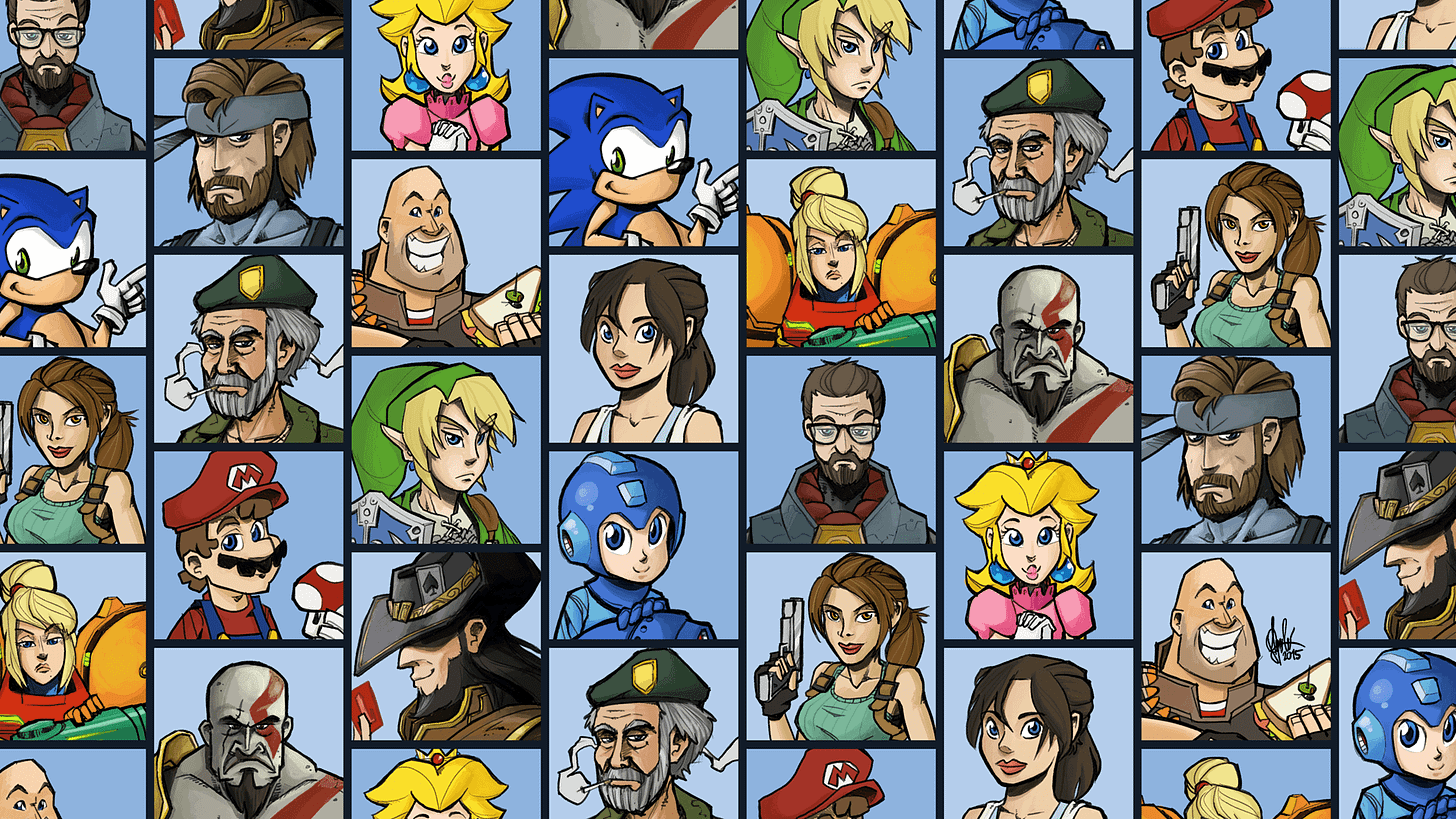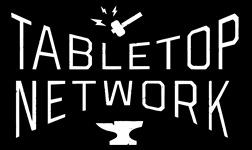Name a character from a video game. Actually, go ahead and name as many as you can think of. I’ll wait a second.
I can come up with a bunch. Mario, Donkey Kong, Master Chief, Lara Croft, Pac Man, Floyd the Robot, Pikachu, Raynor and Kerrigan, Diablo – I could honestly go one for a while. And I’m sure you could as well.
Here’s a random picture I pulled of video game character artwork:
Name characters from books or movies – probably no issue there either.
Now name a character from a board game, that started in a board game. I’ve been asking this question of my board gaming friends over the last few months, and almost everyone comes up blank. After a few minutes they usually come up with Uncle Pennybags from Monopoly or someone from Clue. But that’s about it.
I was thinking about this because I was talking to someone about starting a business to market boardgame tie-in jewelry, figures, and other merchandise. But once you get past the meeple it’s pretty slim pickings in board games.
This has been a huge source of revenue for Nintendo and other companies. But why hasn’t it happened in board games? Why don’t we have iconic characters like video games, TV, movies, and books have? Other types of media have spawned culture-defining characters. Why not board games? Can you even name ONE character from Descent? Or Mice and Mystics? I can’t. I have a plushie of the Racoon from Root. Does he have a name? I know the faction is called “Vagabond”, but I always thought of that as more of a description than his name.
One explanation I’ve heard is that video game characters have stories and narrative. That makes them seem more real, and more relatable, and they stick in our memories and take on iconic status. Board games typically don’t do this. If there is a narrative, it’s the players that are experiencing that narrative. You don’t become a character like you become Lara Croft in Tomb Raider. We have plenty of games that cast you in a role like hers, adventuring through caverns, but you don’t become the central character in the same way.
In fact, board games are taking the lead from role playing games, and moving further away from the character existing outside the player. For example, in Pandemic: Legacy, which strives for real narrative, you name your own characters. They just have generic designators like “The Medic” or “The Dispatcher” or – and this really gets you involved in the character – “The Generalist”.
And single player video games tend to be better at identifying the players with a strong central character. If there are four players, they can’t all be the lead. And so the stories tend to be more diffuse.
But honestly I don’t think story is the real reason here. Counter-argument #1: Pac-Man. Pac-Man has no story. He got a little bit of a story in Ms. Pacman, but that came out way after he was already a cultural icon. Yet he was huge, from both a game and IP standpoint. Those of you too young to remember the 80’s have no idea how pervasive Pac-Man fever was. The big board-game-related popular culture artifact from the 80’s was probably Trivial Pursuit. The big sellable IP there outside the game was the pie wedges.
Even Mario in early games really didn’t have a story. At least not one that people remember from Donkey Kong or Super Mario.
Another theory, perhaps a bit related to the narrative idea, is the idea of distance. There needs to be some distance between the player and their avatar to develop that attachment. They need to become almost like a pet. That’s why typically people don’t identify as much with their character in a first-person shooter, as they do in a third-person game – Half Life’s Gordon Freeman being a notable exception.
This may actually help explain why the few characters in board games that have some life outside the game tend to be the non-player characters. Or in a game like Clue, where the characters seem separate from the character that you’re playing, since you don’t even know if you committed the murder. Dr. Lucky, from Kill Dr. Lucky, is an example of a character that seems to exist beyond the players and the game. As he wanders around the house in a doddering way the players can ascribe characteristics to him.
I’m still not convinced this is the explanation, though. Maybe we’re thinking too hard – maybe it’s as simple as repetition. In many video games the name of the character is said over and over again by other characters. You don’t have that in a board game – except, again, in Clue. Your character name is rarely said. Books don’t have this problem, either. The character name is on page after page.
Or it could be the visual representation. In board games characters are very abstractly represented – pawns or meeples. And even if they have an elaborate character portrait, it’s just one piece of art, and that’s it. You don’t see the character the entire game in different situations and poses, that makes them the constant in a changing environment, like in a video game.
Or another simple idea – maybe it’s just the animation of a character. If Pac-Man was just a static yellow circle with a wedge missing – would he have become iconic? It’s the motion, the opening and closing of his mouth that gives him life. And we don’t have that motion in board games.
So in the end I’m not sure. It’s probably all of this and things I haven’t thought of. But I do think it’s important for the next level of board games. If someone can have characters escape the boundaries of the game box and become a real IP – that could be a game-changer for a company, and for an industry. Miniature game companies like Games Workshop and Privateer Press work hard to give their characters life beyond the game. But they do it through media outside the game – books and stories in source books or magazines.
What do you think? Why hasn’t this happened? Is it possible for it to happen? And is it desirable?
Tabletop Network
The lineup for the Tabletop Network conference continues to grow. Now featuring presentations from Matt Leacock, Eric Lang, Jennifer Graham-Macht, Danni Loe, Martin Wallace, and a game jam with Kathleen Mercury!
It is held November 12-14 in Dallas in the days leading up to BGG.Con, in the same venue.
Badges are still available, but the registration window is rapidly closing. Click here to register!






After thinking for awhile about this, I actually *was* able to come up with some named characters with personalities in tabletop games - largely starting with anything involving miniatures, because right there you've got this tangible model that just drips expressiveness. Whatever the other flaws of Warhammer, it isn't lacking for lore; pick any WH40K mini, even the least imposing, and there's a backstory there explaining what that lil guy is.
Even outside of miniatures games, most games that use miniatures have some kind of name: the quirky robots in RoboRally, the scooby-gang-like explorers in Betrayal at House on the Hill. Some games even just have little cardboard stand-ups but with named characters with personalities, like the boardgame Android (which they did "merchandize" in the sense of reusing the IP for the Netrunner reboot, at least, though I doubt anyone ever said they'd want a plushie of a washed-up alcoholic detective), or Arkham Horror. Heck, even the characters in Talisman had a paragraph of flavor text, didn't they?
If we expand "board games" to include all tabletop including card games, TCGs like Magic are rich with characters - Urza, Mithra, Jace, dozens of others - and those *do* have merch associated with them, from posters to play mats to miniatures. I wouldn't be surprised if there are Magic-branded action figures and plushies out there somewhere.
I suspect what it actually comes down to is just market size. You mention Pac-Man as an example, but as you say, that character was just SO widespread in pop culture at the time. By contrast, even a highly successful boardgame just doesn't have that kind of reach. That's why Uncle Pennybags from Monopoly or the characters from Clue come to mind - those are two of the few games that really were big enough hits to have a real effect on pop culture. Probably the closest hobby game to reach those numbers was Catan (and Mayfair did sell wood/wheat/sheep/ore/clay plushies, though they weren't really a huge money-maker AFAIK). Of the hobby games that have actual characters... well, show me one that has the widespread appeal and recognition of Pac-Man, and I'll show you a game with merch, but I don't think there is one.
Closest other example I can think of is Dungeons & Dragons, which has a ton of canonical lore which did make it into the recent movie, and had enough effect on pop culture to use its IP for a movie in the first place. (I didn't look to see if there were any action figures from that movie, but I'd be shocked if there weren't.)
Anyway, I'd say that popularity by sheer numbers is the main stopping point here, rather than lack of characters.
(That said... would definitely encourage designers to design characters for their boardgames when appropriate. Geoff, not sure if you saw my prototype of Prism Break some years ago at Protospiel, but if you did, I did include some light backstory for the characters there - related to the mechanics, even - and writing that was super fun and let me include a kind of "easter egg" for players who took the time to look closely at the player mats. Even though I wouldn't expect anyone to make t-shirts or action figures of those characters ever, it was just fun to include and cost me nothing extra, so why not?)
Isn't it about the genre more than anything else? Memorable video game protagonists all originate from character-driven games, I can't name any that originates from an RTS or a management game (and even worse if it's multiplayer-oriented games).
Even in video games with narrative, if the protagonist is randomized (or a group of people), they won't become an IP in themselves, while some of the villains/side characters may become recognizable.
The 'PacMan' example is interesting: to me, it's more of a mascot, a pawn you use as a link between you and the game. It's recognizable because it has a distinct visual... but I can't think of any popular board game where you interact with the whole experience using a single pawn (not even Monopoly, where you manipulate cards & money).
Could you create a compelling board game experience that is centered around a single character you can get attached to? Now that's an interesting design challenge